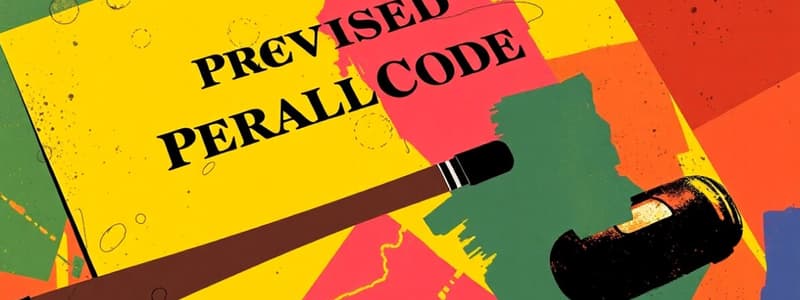Podcast
Questions and Answers
Which of the following does the Revised Penal Code apply to?
Which of the following does the Revised Penal Code apply to?
- Offenses committed on a Philippine ship (correct)
- Crimes against national security (correct)
- Actions performed outside Philippine territory
- All of the above
What branch of law defines crimes and provides for their punishment?
What branch of law defines crimes and provides for their punishment?
Criminal Law
Congress can enact ex post facto laws.
Congress can enact ex post facto laws.
False (B)
Which of the following characteristics describe Criminal Law?
Which of the following characteristics describe Criminal Law?
What is required for an act to be considered a felony?
What is required for an act to be considered a felony?
What does 'Aberratio Ictus' refer to in criminal law?
What does 'Aberratio Ictus' refer to in criminal law?
What constitutes a consummated felony?
What constitutes a consummated felony?
Conspiracy to commit a felony is always punishable.
Conspiracy to commit a felony is always punishable.
What are the three categories of felonies mentioned?
What are the three categories of felonies mentioned?
Study Notes
Application of the Revised Penal Code
- The Revised Penal Code applies within the Philippines, including its atmosphere, waters, and maritime zone.
- The Code also applies outside Philippine jurisdiction in the case of:
- Crimes committed on Philippine ships or aircraft.
- Forging or counterfeiting Philippine currency.
- Acts related to introducing counterfeit obligations or securities into the Philippines.
- Public officers or employees committing offenses in the exercise of their duties.
- Crimes against national security and the law of nations.
Criminal Law and its Limitations
- Criminal law defines crimes, their nature, and provides punishments.
- Congress has limitations when enacting penal laws:
- Ex post facto laws are prohibited: Laws that punish actions that were legal when committed.
- Bills of attainder are prohibited: Laws that punish individuals without a trial.
- Equal protection clause: Laws must apply equally to all individuals.
- Cruel and unusual punishments and excessive fines are prohibited.
Characteristics of Criminal Law
- General: Applies to all persons within Philippine territory except for:
- Treaty stipulations.
- Laws of preferential application.
- Principles of Public International Law.
- Territorial: Penal laws are enforced within Philippine territory only, with exceptions as outlined in Article 2 of the Revised Penal Code.
- Prospective: Penal Laws cannot punish acts that were not punishable at the time they were committed, unless the new law is more favorable to the accused. Exceptions:
- The new law explicitly states it's not applicable to pending actions or existing causes of action.
- The offender is a habitual criminal.
Elements of Felonies
- A felony requires:
- An act or omission (external action).
- An act or omission that is punishable by the Revised Penal Code.
- The act must be performed or the omission occurred with intention (dolo) or negligence (culpa).
Criminal Liability
- Criminal liability is incurred by:
- Anyone committing a felony, even if the outcome differs from their intention.
- Anyone attempting to commit a crime against persons or property, even if the act is impossible or the means inadequate.
Aberratio Ictus and Error In Personae
- Aberratio Ictus: Mistaking the target, intending to hit one person but hitting another.
- Error In Personae: Mistaking the identity of the victim.
Stages of Felonies
- Consummated Felony: All elements for the crime's execution and accomplishment are present.
- Frustrated Felony: The offender performs all acts of execution that would produce the felony, but the felony does not occur due to factors beyond the offender's control.
- Attempted Felony: The offender begins committing the felony with direct or overt acts, but does not complete all actions due to causes other than spontaneous desistance.
Conspiracy and Proposal to Commit a Felony
- Conspiracy: Two or more people agree to commit a felony and decide to carry it out.
- Proposal: A person who has decided to commit a felony proposes its execution to another person or persons.
- Note: Conspiracy and proposal are only punishable if specifically outlined in the law.*
Levels of Felonies
- Grave Felonies: Punishable by death or penalties that are afflictive in any of their periods (as per Article 25 of the Revised Penal Code).
- Less Grave Felonies: Punishable by penalties that are correctional in their periods.
- Light Felonies: Punishable by penalties that are light, in accordance with Article 25 of the Revised Penal Code.
Studying That Suits You
Use AI to generate personalized quizzes and flashcards to suit your learning preferences.
Related Documents
Description
This quiz explores the scope and application of the Revised Penal Code in the Philippines. It delves into its jurisdiction, limitations, and the definition of crimes under the law. Test your understanding of criminal law principles and their implications.




